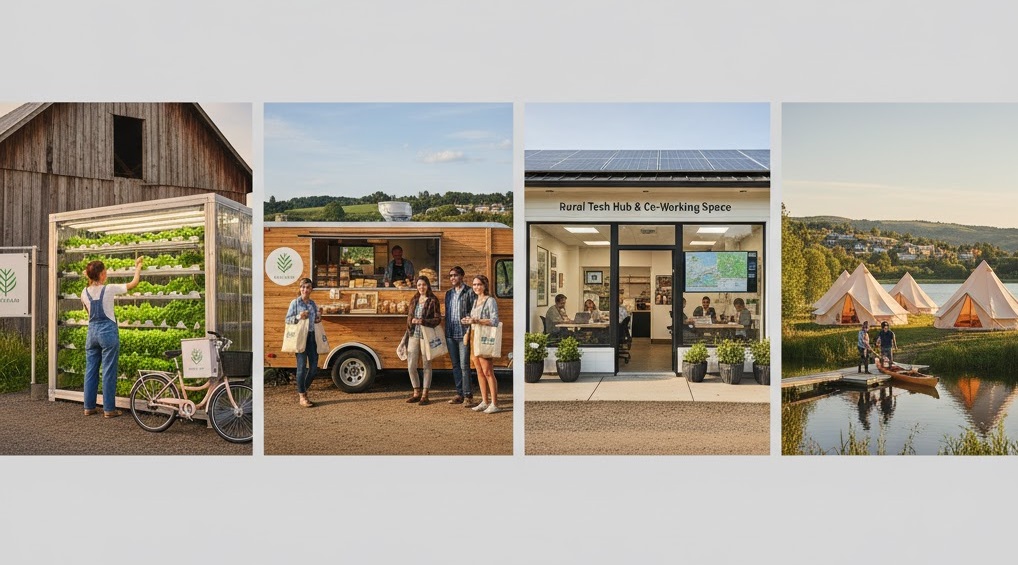In recent years, rural America has experienced a quiet transformation. Once seen as solely agricultural communities, small towns and rural regions are now brimming with entrepreneurial potential. With the rise of remote work, e-commerce, and renewable energy, new business opportunities are reshaping the economic landscape outside major U.S. cities.
According to a 2024 report by the U.S. Department of Agriculture (USDA), small businesses are the primary economic engine in rural areas, accounting for nearly 60% of new job creation. Whether you live in a farming town, a mountain village, or a lakeside community, there’s never been a better time to start your own business close to home.
This guide explores the best small business ideas for rural America, practical steps to launch them, and insights backed by research from leading universities on rural entrepreneurship and sustainability.
Why Rural America Is Ripe for Entrepreneurship
Before diving into the list, let’s understand why rural areas are becoming business hotspots.
1. Lower Costs and Less Competition
Rent, utilities, and labor costs are significantly lower in small towns compared to metropolitan regions. This makes it easier for startups to achieve profitability faster.
2. Growing Local Demand
Many rural communities lack access to certain products or services. Entrepreneurs can thrive by filling local gaps — from essential services to unique local products.
3. Remote Work Opportunities
High-speed internet expansion — part of the Federal Communications Commission’s (FCC) broadband initiative — has opened doors for online businesses in areas previously left behind by digital infrastructure.
4. Community Support
Rural consumers often support local businesses enthusiastically. Strong word-of-mouth and loyalty can sustain enterprises with smaller customer bases.
Scientific Perspective
A University of Wisconsin–Madison study on rural innovation found that community-based entrepreneurship not only boosts local economies but also strengthens social ties and reduces unemployment rates.
Top 15 Small Business Ideas for Rural America (2025 Edition)
Below are high-potential business ideas suited to rural markets — both traditional and tech-driven — that can generate sustainable income and employment.
1. Organic Farming and Specialty Crops
Organic and sustainable farming continues to grow as consumers demand cleaner, locally sourced food. In rural America, this is a natural advantage.
Examples:
- Organic vegetables and herbs
- Free-range poultry
- Specialty crops like lavender, mushrooms, or hemp
Startup Tips:
- Apply for USDA organic certification to reach premium markets.
- Sell directly at farmers’ markets or through farm-to-table networks.
Scientific Insight:
According to Cornell University’s Agricultural Economics Department, small organic farms can earn up to 30% higher profit margins than conventional farms due to lower input costs and growing consumer trust.
2. Agritourism
Combine agriculture and tourism for a profitable business model. Farm stays, vineyard tours, and seasonal events attract city dwellers seeking authentic rural experiences.
Potential Activities:
- Pumpkin patches and corn mazes
- Winery or dairy tours
- Bed & breakfast stays on farms
Why It Works:
The University of Vermont found that agritourism not only increases farm income but also preserves rural heritage and provides educational opportunities for visitors.
3. Renewable Energy Services
With the U.S. pushing for cleaner energy, solar and wind power projects are booming in rural areas. Entrepreneurs can provide installation, maintenance, and consulting services for renewable energy.
Business Models:
- Solar panel installation for homes and farms
- Small-scale wind turbine setup
- Energy efficiency audits
SEO Keywords: renewable energy rural America, solar business ideas, sustainable small business
4. Rural E-Commerce Store
Internet access in rural regions is improving, thanks to federal broadband investments. Now, residents can run successful online stores from their homes.
Popular Niches:
- Handmade crafts
- Organic skincare
- Local produce subscription boxes
Pro Tip:
Use platforms like Etsy, Shopify, or Amazon Handmade to sell locally made products nationwide.
5. Food Truck or Mobile Café
Even small towns have coffee lovers and foodies. A mobile café or food truck can reach multiple communities without the overhead of a fixed location.
High-Demand Items:
- Local BBQ and baked goods
- Artisan coffee
- Farm-fresh breakfast options
Bonus Tip:
Partner with local events, fairs, and schools for consistent customers.
6. Home-Based Bakery or Catering Service
If you love baking, a home-based bakery can be a great way to serve rural communities — especially where dining options are limited.
Examples:
- Custom cakes for weddings and birthdays
- Meal prep and catering for local events
- Specialty goods like gluten-free or vegan treats
7. Outdoor Adventure & Eco-Tourism
Rural America boasts incredible natural landscapes — ideal for outdoor recreation businesses.
Ideas Include:
- Guided hiking or camping tours
- Kayak and bike rentals
- Nature photography workshops
Research Insight:
A University of Colorado Boulder study highlighted that eco-tourism businesses in rural areas increase local employment by up to 20% while encouraging environmental conservation.
8. Elderly Care Services
With an aging population, in-home elderly care is one of the most in-demand services in rural areas. Families often seek reliable caregivers nearby.
Services Can Include:
- Home visits and companionship
- Transportation assistance
- Light meal prep and errands
Pro Tip:
Get licensed as a home care provider and partner with local healthcare centers.
9. Childcare Center or Preschool
In many small towns, parents struggle to find quality childcare options. Opening a licensed daycare or early education center can fill a vital need.
Startup Essentials:
- Secure state licensing and background checks
- Offer flexible hours for working parents
- Incorporate play-based learning
10. Local Transportation and Delivery Services
Rural residents often travel long distances for groceries, medications, or deliveries. A small transport or courier business can meet this gap.
Services You Can Offer:
- Local delivery for businesses and residents
- Ride-share or shuttle service for seniors
- Farm supply transportation
SEO Keywords: rural delivery business, transportation startup small towns, logistics in rural areas
11. Repair and Maintenance Services
Mechanics, electricians, and handymen are always in demand in rural communities — especially where large companies don’t operate.
Possible Businesses:
- Small engine repair (lawnmowers, tractors)
- Plumbing and electrical services
- Mobile auto repair
Pro Tip:
Offer subscription-based maintenance plans for consistent revenue.
12. Internet-Based Services (Freelance, Marketing, Consulting)
With better connectivity, many rural entrepreneurs are turning to online work to reach global clients.
Popular Remote Professions:
- Social media marketing
- Freelance writing or design
- Online bookkeeping or virtual assistance
Research Backing:
According to Stanford University’s remote work study, small-town professionals who work online experience 35% higher work-life satisfaction than those commuting to cities.
13. Lodging and Short-Term Rentals
If you own property in a scenic or historical rural area, consider turning it into a vacation rental.
Platforms: Airbnb, Vrbo, Booking.com
Add Local Flair:
- Offer guided tours or homemade breakfast
- Provide “farm stay” packages
SEO Keywords: Airbnb rural America, small-town vacation rental, local tourism business
14. Mobile Veterinarian or Pet Services
Rural areas often lack local veterinarians or pet grooming services. Starting a mobile vet clinic, grooming service, or pet boarding facility can meet an essential need.
Business Variants:
- Pet grooming and boarding
- Animal feed delivery
- Farm animal care consulting
15. Recycling and Waste Management
With growing environmental awareness, rural waste management presents new opportunities. You could start a local recycling pickup service or composting business.
Niche Ideas:
- Agricultural waste recycling
- Community compost programs
- Plastic or scrap metal collection
Table: Best Rural Business Ideas and Startup Costs (Estimates)
| Business Idea | Startup Cost Range (USD) | Profit Potential (Annual) | Difficulty Level |
|---|---|---|---|
| Organic Farming | $5,000 – $25,000 | $30,000 – $100,000 | Moderate |
| Agritourism | $10,000 – $50,000 | $50,000 – $200,000 | High |
| Food Truck | $20,000 – $60,000 | $40,000 – $150,000 | Moderate |
| Renewable Energy Services | $15,000 – $40,000 | $60,000 – $250,000 | High |
| Online Store | $1,000 – $10,000 | $20,000 – $150,000 | Low |
| Home Bakery | $2,000 – $8,000 | $25,000 – $75,000 | Low |
| Elderly Care Services | $5,000 – $15,000 | $40,000 – $120,000 | Moderate |
| Eco-Tourism | $8,000 – $30,000 | $50,000 – $200,000 | High |
| Repair Services | $3,000 – $12,000 | $30,000 – $100,000 | Low |
| Short-Term Rentals | $10,000 – $40,000 | $50,000 – $180,000 | Moderate |
How to Choose the Right Business for Your Rural Community
When selecting a business idea, consider the specific needs and resources of your local area. Ask yourself:
- What’s missing in my town? (e.g., no local bakery or daycare)
- What natural or cultural advantages exist? (e.g., scenic farms, heritage sites)
- What skills or passions do I have?
- What’s the local population and spending power?
Market Research Tip
The University of North Carolina’s Rural Economic Development Center recommends conducting community surveys and focus groups before launching. This ensures your idea meets real local demand.
Government and Nonprofit Support for Rural Entrepreneurs
The U.S. government and several nonprofits offer grants, mentorship, and funding for small businesses in rural communities.
| Program | Organization | Type of Support |
|---|---|---|
| Rural Business Development Grants | U.S. Department of Agriculture (USDA) | Grants for rural startups and expansions |
| Small Business Innovation Research (SBIR) | U.S. Small Business Administration | Funding for technology-based ventures |
| Rural LISC | Local Initiatives Support Corporation | Business training and capital access |
| Women’s Business Centers (WBC) | SBA | Free mentoring for women entrepreneurs |
| America’s SBDC Network | Small Business Development Centers | Free business planning support |
Scientific and Research Insights
- Stanford University (2023): Found that rural entrepreneurs who adopt digital tools are 50% more likely to scale operations beyond their region.
- University of Minnesota: Reports that community-supported businesses improve local employment and increase GDP contribution by 2–4% in small counties.
- Harvard Kennedy School: Emphasizes that rural women entrepreneurs are driving post-pandemic recovery through micro-enterprises and home-based startups.
FAQs About Starting a Small Business in Rural America
1. What business is most profitable in rural areas?
Agritourism, renewable energy services, and food production businesses often perform best because they leverage local strengths and meet strong consumer demand.
2. Can I start an online business while living in a rural area?
Yes. With expanding broadband access, rural residents can run e-commerce stores, remote freelance services, and digital marketing agencies from home.
3. How do I find funding for my rural business?
Explore USDA Rural Development Grants, SBA microloans, and community banks that specialize in rural entrepreneurship financing.
4. What challenges do rural entrepreneurs face?
Common challenges include limited access to high-speed internet, smaller customer bases, and difficulty attracting skilled labor. However, community loyalty often offsets these limitations.
5. Do I need special permits to start a farm-based business?
Yes, depending on your location. Contact your state agriculture department and local zoning office for guidance on permits and safety regulations.
6. How can I attract customers to a rural business?
Use social media marketing, local SEO, and partnerships with local organizations to reach both residents and tourists.




